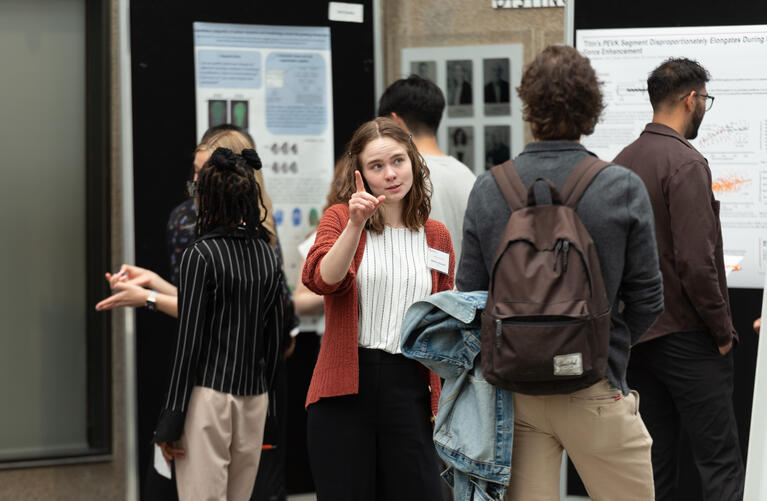
Giving Day is April 2-16
You don’t have to work in a lab to advance research breakthroughs or be on campus to help students succeed — your gift makes it happen.
UCalgary ranks among Canada’s top research universities. With $588.5 million in sponsored research revenue in 2023-24, we are generating real-world impact for Canadians.

SPARC Ignite Grants
UCalgary ranks among the country’s top research universities and is the no. 1 startup creator in Canada. With your generous support, we are breaking down barriers to innovation, creating new industries and shaping the future of higher education.
Your contribution to our SPARC Ignite Grants this upcoming Giving Day will help our researchers reach new heights, generating real-world impact for Canadians. Your gift to SPARC Ignite Grants can have triple the impact this year! In addition to UCalgary, the McCaig Institute for Bone and Joint Health will generously match all gifts, up to $2,500 per gift, while matching funds last.
SPARC Success Stories
The McCaig Institute's SPARC Ignite Grants fuel transformative innovations in bone and joint health research. As we approach Giving Day, we invite you to explore these remarkable projects and consider supporting this vital initiative.
-
Fanning the flames
Dr. May Choi, MD, MPH, FRCPC, and Dr. Antoine Dufour, PhD, are advancing innovative research on Sporadic Inclusion Body Myositis ), a rare autoimmune disease. With support from SPARC Ignite Grants, they are merging their expertise in antibodies and proteomics to tackle the challenge of early diagnosis.
By applying machine learning, they are identifying novel biomarkers that may enable earlier detection and a better understanding of sIBM. "Our findings demonstrate activation of the immune system and suggest potential pathways involved in muscle breakdown," notes Dr. Choi.
With community support, their research could lead to groundbreaking diagnostic tools and treatments, offering new hope to patients.
-
Accelerating innovation
Dr. Brent Edwards, PhD, and Dr. Schneider, MD, PhD, are leveraging the SPARC program as a catalyst for innovation in bone health and osteoporosis. With initial support from SPARC Grants, Edwards and Schneider gathered crucial early data on bone health and osteoporosis treatments, such as Bisphosphonate (BP) therapy.
Their work focused on understanding how bone remodeling impacts quality and strength, with potential implications for future drug treatments. This foundational data was instrumental in helping Edwards secure a prestigious national grant, allowing for a deeper exploration of these important questions.
"The SPARC grant was pivotal in our research journey," Edwards explains. "It provided the initial support we needed to gather data that ultimately led to securing significant national funding." This research aims to inform treatment decisions and prevent fractures, showing how small initial investments can lead to major advancements and national recognition.
-
Embers of empowerment
Dr. Leigh Gabel, PhD, Dr. Lauren Burt, PhD, and Dr. Emma Billington, MD, FRCPC, are leading innovative research to fill a critical gap in women's health. Their SPARC-funded pilot study tackled bone loss during early menopause by exploring how strength training can prevent bone and muscle deterioration.
Their 9-month high-intensity resistance and impact training program focused on improving bone density, structure, and strength. "The seed grant allowed us to collect biomarkers of bone turnover not possible through routine analysis," says Dr. Gabel. "It has to start from somewhere, and that little bit can catalyze something much bigger."
With plans to expand this research to a larger cohort, their long-term goal is to develop a national program that offers proactive solutions, empowering women to protect their health now and in the future. "Our goal is to provide proactive solutions that empower women with the tools to make changes for their health now and in the future," explains Gabel.
-
Illuminating new paths
Dr. Ranita Manocha, MD, and Dr. David Hart, PhD, are using SPARC Ignite grants to study how the menstrual cycle affects joint laxity in hypermobile individuals. "This study aims to uncover hormonal mechanisms influencing knee laxity and injury risk," explains Hart.
With SPARC support, PhD candidate Donald Golden expanded the study from nine to 30 participants and added muscle studies, securing an additional $400,000. "We've leveraged the seed grant funding to obtain another $400,000 towards this project," says Manocha. Golden's commitment to patient-centered research has been strengthened. "It's cemented my desire to work with patients, identify their problems, bring those insights to research, and find solutions," he states.
Why Your Giving Matters

Philanthropy allows us to explore new ideas and innovate, supporting the education and training of future researchers."
Dr. Leigh Gabel
Researcher
When you contribute to Giving Day, it sparks a partnership: together, we'll enhance patients' lives and fuel groundbreaking innovation."
Dr. May Choi
Rheumatologist and researcher

Your contribution, no matter how small, can make a meaningful difference and create a lasting impact."
Dr. Ranita Manocha
Physiatrist and researcher
Philanthropy plays a crucial role in our mission. Your contributions not only help us answer pivotal scientific questions but also invest in the education, training, and development of exceptionally qualified individuals."
Dr. Brent Edwards
Researcher


